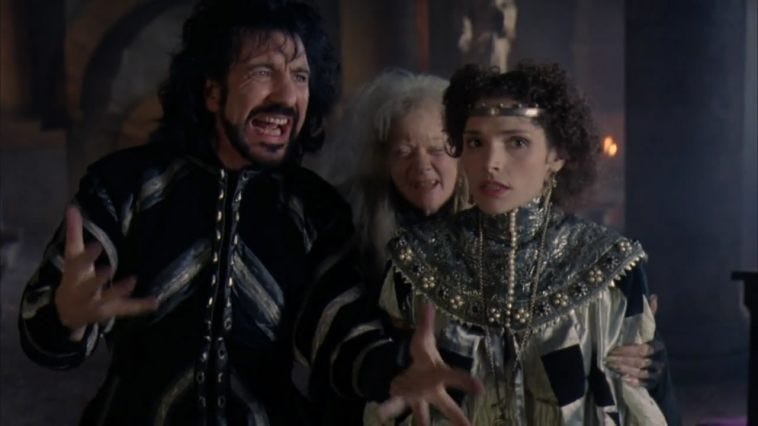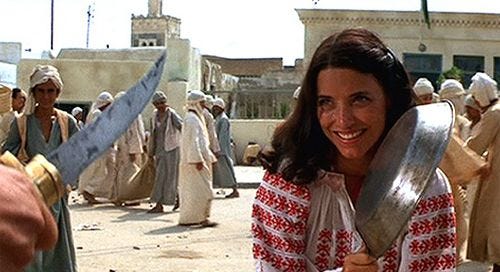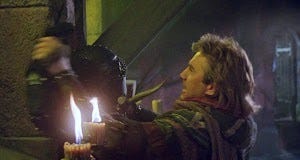Problematic Badass Female Tropes #1
The Marion Effect
Robin Hood, dusty from travel, fatigued with tragedy, warily steps into the castle foyer. The heavyset woman with the gravelly voice has introduced herself, but she’s definitely not his childhood friend. Attempting to pry further, he makes chitchat and asks questions, to no avail.
Suddenly, a muscular masked figure in a full black (rather anachronistic) almost ninja-like suit emerges from the shadows, and puts the Good Hood at swordpoint. This escalates quickly into a knockdown, drag-out fight that forces Robin to make do with found weapons that aren’t super-helpful (short sword vs. antlers almost leads to his demise).
He finally gets the masked stranger pinned, managing to succeed with a disarm by forcing his adversary’s knife-wielding hand onto a nearby candle flame. Only then, when he hears the high pitch of the mysterious fighter’s cry of pain does he realize he’s been battling A WOMAN.
He unmasks her just as his sidekick manages to crash the party, a distraction she uses to her advantage by disarming Robin with a vicious groin kick. Robin’s sidekick looks witheringly at him (and later he will be mocked for losing a fight to a woman), as he, groaning with pain, greets the ninja-clad woman thusly: “Hello, Marion.”
What a badass female character. And what an introduction! But even way back in distant 1991 when this movie came out (this is Robin Hood, Prince of Thieves, kids), young as I was and only just beginning to embark on what would become a lifelong journey into the development and study of multiple badass arts, I found myself confused and disappointed with Mary Elizabeth Mastrantonio’s Maid Marion.
Why? Well, at the end of the movie she allows herself to be dragged off by one wrist by the comparatively scrawny Sheriff of Nottingham. Nevermind the fact that, while captive, he proceeds to attempt a comedic rape (another problematic treatment of the female character in and of itself), but just the fact that he could capture her at all, let alone so easily, made zero sense to me.
Did she suddenly forget all of her martial arts skills? What happened to her physical strength and agility, so highly on display when we first meet her? You’re telling me that this is the same badass who gave and took a serious beating and ended up victorious, who now can only scream “Robin!” out of a tower window? Seriously, she was dragged along by one wrist by a man half her size. Where’d all the kickass moves go? Why is she suddenly a damsel in distress? She went from warrior to completely useless for no story driven reason I could see. Oh, right: except her purpose changed, didn’t it? It changed to her only being there for Robin Hood to rescue. God forfend she use her own strength and skills to take care of herself.
Now before you decry this for being the awful movie that it admittedly was, dear readers, allow me to describe another example, this one from an adventure flick widely thought of as excellent.
This badass female character, also named Marion, owns her own tavern. When we are first introduced to her, she too is engaged in a battle of sorts: a drinking contest, which she wins with apparently little effort. For all the acting this Marion does to sway the betting, when she emerges victorious she barely seems tipsy.
When Indiana Jones first emerges onto the scene, she stands up for herself (some intimated backstory of a questionable relationship notwithstanding), and when the big fight against the Nazis breaks out in flames, she’s an equal contender to seasoned brawler Indy. They have each other’s backs through the whole fight, and it’s her sharp eye under pressure as well as her sharp shooting that allows them both to emerge relatively unscathed as well as victorious. But her declaration, “I’m your goddamn partner!” is short lived.
When Marion and Indy continue their adventure, she’s not his partner at all, but easily captured and rendered into someone Indy must now rescue. This Marion, like Maid Marion above, is a character that flips from intelligent, independent, warriorlike badass into a damsel in distress that can only squeal “Indyyyyyy” in the highest of pitches as she’s carted off by the baddies.
In this world of systematized misogyny, problematic sexist tropes are all too apparent. Many of these are easy to spot: the Damsel in Distress and the Manic Pixie Dream Girl are two in particular that are getting lots of attention these days, and in the wake of #metoo, most of us are questioning them.
What I have noticed, however, is that these problematic tropes are indeed everywhere, even in the female characters that are badass or otherwise portrayed as strong. I have pinpointed several problematic tropes distinctly found in badass female characters (seven in total), that I have analyzed, explored, and challenged. I talked about this last Wednesday, in my overview. This first one I call “The Marion Effect.”
I named The Marion Effect after the two characters described above, but this problematic trope happens all over the place. It’s a simple concept: the character is first introduced to us as a badass, but then once the male hero/protagonist is on the scene, she flips, transforming into a damsel in distress, her only function to be rescued by the male hero. Sometimes the flip is so ridiculous as to be obvious (like the suddenly useless Maid Marion), other times it’s hard to spot, other than a sort of niggling feeling that something’s wrong.
This is how Marion Ravenwood feels to the viewer: she does, to her credit, try to get away from Big Bad Belloq later, using her hard drinking skills and quick wit, but doesn’t get anywhere, and in fact remains only the Princess Peach for Indy’s Mario, as he must adventure from site to site to rescue both her and the story’s McGuffin (not necessarily in that order).
What’s especially insidious about the Marion Effect is this feeling of being cheated. Since the characters start off so strong, independent, and otherwise badass, it almost feels as if the filmmakers want us to be complacent about their switch to utter uselessness later. Like: hey, don’t complain, she’s a strong female character, see? Yeah but she’s not, really: all the badassness in that case is a way to add flavor to the object of rescue. After that first shared-duty fight scene, Marion Ravenwood is no help to Indy’s quest at all—again, she’s merely rendered into a second thing he needs to rescue from the bad guys. Robin Hood’s Maid Marion loses all her warrior’s skills instantaneously after that first fight—she’s not even able to help fend off her captors once Robin arrives, but falls into the female fight scene trope of standing off to the side and grabbing things that aren’t really good for fighting and squeaking the hero’s name.

As a real-life badass woman being subverted daily by the culture which surrounds me, I want to bring to light the underlying problems with these current tropes, and question what we as entertainment consumers have been taught to think of as badassery. After all, the depictions of women in our entertainment have everything to do with how we view real women in our real world. Our entertainment builds our social mores, enriches our lives, and in many cases dictates the choices we make. It’s not that I’m saying none of us should be allowed to enjoy any of these characters, just that as we enjoy them, we need to make sure we have a clear view of what these problematic badass female tropes mean, what they’re doing to us, and how our absorption and acceptance of them affects the real life badass women all around us.
(Yes, that last paragraph is only slightly altered from my overview post from last week. I wanted to reiterate these things, though, because I’m not going to emphasize the why quite as often when I continue my analyses of each trope moving forward. So anyway, if you noticed? Good job, you’re a close reader. Here’s a cookie.)






Great essay! Recently I've been introducing my youngest son to a lot of the old musicals that I loved enjoying so much with my own mother, and they have inspired a LOT of good conversations around sexism and the tropes that are perpetrated upon us though popular media. My son is 11, and I'm constantly impressed by how aware and savvy he is about things like this. Makes me a proud mama. 😁
This is indeed one of the most annoying things about adventure movies and was noticed by my friends and I when we saw Raiders back in ‘81 (yeah I’m old; I saw it when it first came out). It’s so many movies; it’s just plain bad writing first off (I mean really in Raiders Indy had absolutely no effect on the final outcome so really what did he accomplish?)…these stories seem to be written largely as barely connected episodes where characters are changed to meet the demands of that particular episode. And yes the damsel in distress is a huge trope. It’s old, too…go back and watch Myrna Loy (my all time favorite actress) in the old Thin Man films with William Powell; she goes from smart and capable to naive and useless just to fit whatever situation the writers had Nick Charles in.
Good one!